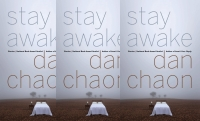And Some For The Day
Reviewed by Nathan Huffstutter
2011, Penguin Books
210 pages, paperback
A guy walks in to a bar and sees a miniature man sitting on a table playing a miniature piano…
Heard that one before? Go ahead and stop me if you must, but keep in mind, if we can’t use a quick shot of taphouse badinage as an entry point into Stories for Nighttime And Some for The Day, our next alternative is a sober dissertation on monomyths and Old Joe Campbell.
Right. So where were we? Opening lines? Here – take a crack at a few of Ben Loory’s:
–“A man comes home from work one day to discover his daughter has found God.”
–“A hunter returns to his village one night with a severed human head in one hand.”
–“A man is walking through the woods, when suddenly he sees Bigfoot.”
In stories that hit the ground running, using sentences of pure declarative efficiency, Loory seizes his unnamed protagonists and thrusts them into confrontation with the fantastic: flying saucers and domesticated martians, creatures from the deep dark sea and the deeper, darker subconscious, a heaven-sent pig, a talking moose, Bigfoot, practically everything but the proverbial wish-granting genie and that tiny piano player. And like those well-oiled jokesmiths, steeped in the badda-bing of Preparation/ Anticipation/ Payoff, Loory begins with form and allows each curious wonder to reveal itself.
Back to beginnings, again, Stories for Nighttime… opens with a nifty one-two-three, a trio of shorts that individually showcase Loory’s command of structure and, in combination, execute that traditional progression of preparation, anticipation, payoff. “The Book” quickly presents a relatable phenomenon: a woman returns home with a stack of new reading, only to discover the last book in her pile has one-upped Davis Schneiderman and is, literally, nothing but blank pages. Outraged, the woman rails both against the book’s failure to meet her expectations and the prevailing acceptance of those empty pages, becoming so consumed with opposition she gains a measure of discontented fame denouncing the work in a book of her own.
Following that lead, “The Swimming Pool” turns on a barbed hook of anticipation, flipping its own offbeat comic tone when a man hollers “shark!” to warn swimmers of a beast he (and only he) sees at the public pool. Chastened, the man later returns to the pool at night, leaning out over the diving board to gaze down into the dark water.
It is a tremendous thing, the monster below–so big the man missed it before. It is jet black and featureless and lying stretched out, covering the entire bottom of the pool.
…..And the worst thing is that it is staring at the man–staring right back up at him. Staring at him with black, unblinking eyes.
…..It must have been staring the whole time.
The man launches a crusade to drain the pool, falling into an even greater trap: believing danger itself can be legislated out of existence. Building off that creeping anticipation, Loory then dips into “The Tunnel,” a payoff of pure cinematic claustrophobia. Two boys discover a drain pipe in the woods. One ventures in. Avoiding any hint of an over-the-top, Crypt-Keeper cackle, Loory stays true to his stark phrasing as the boy crawls further and further, the pipe growing darker, narrower, closer, “Until – suddenly – he realizes he couldn’t turn around if he tried.”
Yes, there are lessons here. And another lesson, right up there with never get involved in a land war in Asia, never trust someone like me who name-drops Joseph Campbell and swears they won’t be going on to a tiresome bit about The Hero With A Thousand Faces. But the patterns are too monumental to sidestep, and besides, Mister Campbell has at least done the favor of providing us a concise definition for the 39 shorts compiled in Stories for Nighttime and Some for The Day:
A hero ventures forth from the world of common day into a region of supernatural wonder: fabulous forces are there encountered and a decisive victory is won: the hero comes back from this mysterious adventure with the power to bestow boons on his fellow man.
Departure/ Initiation/ Return. While the bulk of his stories exist in this mythic framework, Loory beguiles by fitfully mucking with the victories and slipping decoys in place of the promised boons. Anxiety shadows the entire collection, an inspired gathering of neuroses that lend themselves more to reversals and trapdoors than the pat Hollywood ending. As a matter of fact, the strain of that pat Hollywood ending may be one of the principal causers of these anxieties – at the risk of being overly reductive, Loory’s parables can be read as exorcisms from his screenwriting career, a venting of the ol’ Beverly burnout, trapped too long in an atmosphere where acts of idealism, trust, reciprocity, faith, and kindness are typically met with the same jaded pity reserved for forty-year-old virgins.
In addition to fables foregrounding those common virtues, high-water marks from the collection include an ineluctable tale of risk-compulsion (“The Well”); a tender allegory of a long-distance love affair (“The House on The Cliff and The Sea”); and a surreal flash of disembodied vagina dentata (“The Hat”). And just when you tighten your…grip, anticipating the next reversal, the next trapdoor, Loory plays it straight. Lacking only illustrations, “The Duck” presents a winsome, bedtime read-aloud, with sentences that end on good words, line breaks appropriate to each turning page, and ample opportunity for the rising silly voice, the deepening serious voice, and even the satisfied cadence of happy ending. Here and in the plurality of anthropomorphic stories, with their humanity, humor, and repeat-readability, Loory’s closest kin may truly be the slyly sententious franchises of Mo Willems.
Because Loory’s stories announce their concerns in propulsive forward motion, and because the structure does so much of the heavy lifting, it’s possible to move freely from one entry to the next without the recursive demands of a collection like Nightwork or Some Sexual Success Stories Plus Other Stories in Which God Might Choose to Appear. Completing a short-short by Christine Schutt or Diane Williams, there are characters that need to be shaken off or fully absorbed before advancing; Loory’s protagonists, however, bring neither personality nor personal histories to their situations. The situation is the story, situations consistently played out upon a tabula rasa everyman (or everywoman, or everyboy, or everymoose), more or less the exact everyman whose ultimate wish is granted in the form of a ten-inch pianist.
Never gets old, that one.
For good reason, the veteran barstool comic always keeps the next gag on the tip of his tongue, just as a film studio maintains a slate of future releases. The slimmest of margins separate cheer and groan, a risk Christopher Vogler pointed out in his version of the “Hero’s Journey For Dummies”:
Following the guidelines of myth too rigidly can lead to a stiff, unnatural structure, and there is the danger of being too obvious.
Have we mentioned the trap of believing danger itself can be legislated out of existence? Stories for Nighttime… may seem safely cloaked in its own conventions, but with so many of the shorts exploring explicit metaphors, some of those metaphors ring tinny when considered alongside more rigorous treatments. “The TV and Winston Churchill” illuminates a topic dear to the very best, a topic handled by the very best: the pursuit of pure art countermanded by a proletariat clamoring for pure entertainment. Compared to intricate masterpieces like “August Eschenburg,” however, the lightweight façade of “The TV and Winston Churchill” teeters, and while it may seem unfair to prop a four page short next to a story that runs over sixty, the rules and limitations of Loory’s collection are self-imposed, so final estimations fall within fair bounds. Likewise, “Bigfoot” brims with inspiration, juxtaposing the “Call of the Simpsons” camping episode with the Day of the Locust’s climactic mob scene. Despite the spark of his Homeric mash-up, within its formal constraints, Loory’s “Bigfoot” never evolves to the heights of Groening’s comedy or the depths of West’s satire.
In this light, it’s hardly surprising that Penguin asked Loory to include “The TV” (not to be confused with “The TV and Winston Churchill”), a fortieth story which appears as an anomalous appendix after the collection’s proper sections I./II./III. Though precisely the tacked-on denouement that would leave 3-Act guru Syd Field spinning in his grave (or perhaps he’s still alive and that’s just the thwacking of a dead horse, beaten), the presentation of “The TV” serves purposes both pragmatic and open-ended. In addition to the cachet of its New Yorker pedigree, the language, length, and variation of “The TV” creates a practical sort of expectation; for anyone tempted to patronize or pigeonhole Stories for Nighttime… as a mere novelty, “The TV” previews a different payoff, “Next Scenes” for what likely waits just a few once-upon-a-time’s down the road.
—
—
Nathan Huffstutter is a Contributing Reviewer for Emprise Review







